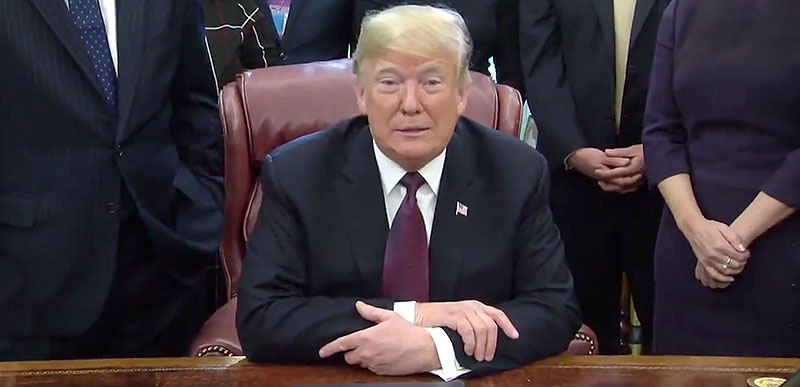Iran's terror master is dead, and the US economy is alive
by Hugo Gurdon
| January 03, 2020 02:23 PM
Joe Biden advised President Barack Obama against going ahead with the brilliant raid that killed Osama bin Laden. But for six months after the event, the veep danced in the end zone, proclaiming, "Osama bin Laden is dead, and General Motors is alive!"
President Trump enters 2020 with an even bigger election-year boast waiting to be taken out of his back pocket: "Qassem Soleimani is dead, and the U.S. economy is alive!"
Soleimani, head of the Quds Force of the Revolutionary Guard, was a ruthless terrorist responsible for the deaths of hundreds of Americans. He commanded Iran's aggressive, hegemonic, revolution-exporting policy throughout the Middle East. He masterminded the 2011 plot to blow up the Saudi ambassador (and collateral diners) at a restaurant in Washington. He had just returned from Lebanon, where he oversaw Hezbollah's murderous mayhem. He exacerbated Syria's appalling civil war. And he was openly in Iraq — how come? — where he partnered with terrorists who had just assailed the U.S. Embassy. He traveled the Middle East like some sort of pasha, confident that although U.S. presidents had the ability to target him, they lacked the will.
Until now.
Needless to say, Speaker Nancy Pelosi denounced Trump's decision to eliminate Soleimani as "provocative and disproportionate."
American leaders’ highest priority is to protect American lives and interests. But we cannot put the lives of American servicemembers, diplomats and others further at risk by engaging in provocative and disproportionate actions. https://t.co/o0R8YVJMNW— Nancy Pelosi (@SpeakerPelosi)January 3, 2020
How on earth, given the catalog of his crimes listed briefly in the paragraph above, do either "provocative" or "disproportionate" come into it? The killing of Soleimani was, in truth, a restrained act. It does not commit the United States to a full-scale Middle Eastern war, or to the ouster of the clerical tyranny in Tehran; that is up to the people of Iran. It does not contradict Trump's election promise not to take America into foreign conflicts.
But it does show American resolve to punish those who threaten our interests and kill our citizens. Many people, reasonably enough, monitored the price of oil and stocks immediately after the attack, but the biggest market surge is the huge increase in the price America's enemies will pay for attacks against us.
Certainly, the elimination of Soleimanimust not be a briefly effective spasm of violence without planning and readiness for its aftermath. The Iranians seem certain to hit back in the short term, even if just to salve their wounded pride. But the mullahs know they have far more to lose from conflict with Americathan we do. Soleimani was fomenting attacks on American diplomats and citizens around the region, with the aim of making Washington back down both in Iraq and in its sanctions regime, which has been crippling Iran's economy. Those sanctions should be tightened as soon as Iran undertakes any act of revenge for Soleimani's death, and tighter sanctions should be accompanied by military punishment.
Democrats are panicking about the domestic response to Trump's attack order, as well they might. They know that voters like strong leadership from someone who won't allow Americans to be kicked around. That's what made Biden's boast so effective back in 2012.
But, as noted, Trump's boast can be even bigger. By the time bin Laden died, his prime was disappearing fast in his rearview mirror. He was holed up in Pakistan, and leadership of nonstate Islamist terrorism had been seized from him by the Islamic State (whose leader, by the by, has also been snuffed out by Trump).
Soleimani was not past his peak terrorist prime. He was in it and was indeed increasingly powerful, the world leader of state-sponsored terrorism. His elimination is a bigger deal than bin Laden's, even if it is less cathartic for Americans.
And what of the comparison between Obama's bailout of GM and Trump's revival of the economy? The bailout involved massive government intervention to give a gift to unions while shafting bondholders and increasing moral hazard, done to save a company crippled because it made unpopular cars at the insistence of, um, Obama. One government intervention led to another government intervention.
Trump, by contrast, has lifted the broad economy by getting government off the backs of business and allowing the productive sector to get busy. He has cut red tape and taxes, creating circumstances in which entrepreneurs and hard workers can flourish. The stock market is worth 25% more than it was a year ago, wages are rising, especially for those on low incomes, and joblessness is at historic lows, especially (again) for those at the bottom of the social heap.
These are powerful arguments to take on to the campaign trail, and they fit neatly together, as Biden showed eight years ago. It is said that Biden is the candidate Trump doesn't want to run against. But he should at least thank the man for handing him a stirring election slogan. 


